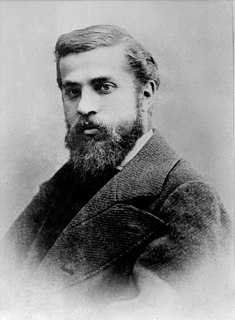A Quote by Walter Russell
Knowledge is cosmic. It does not evolve or unfold in man. Man unfolds to an awareness of it. He gradually discovers it.
Related Quotes
The goal of mankind is knowledge ... Now this knowledge is inherent in man. No knowledge comes from outside: it is all inside. What we say a man 'knows', should, in strict psychological language, be what he 'discovers' or 'unveils'; what man 'learns' is really what he discovers by taking the cover off his own soul, which is a mine of infinite knowledge.
If a man who has committed many a misdemeanor does not repent and cleanse his heart of the evil, retribution will come upon his person as sure as the streams run into the ocean which becomes ever deeper and wider. If a man who has committed a misdemeanor come to the knowledge of it, reform himself, and practise goodness, the force of retribution will gradually exhaust itself as a disease gradually loses its baneful influence when the patient perspires.
In the popular arena, one can tell ... that the average man ... imagines that an industrious acquisition of particulars will render him a man of knowledge. With what pathetic trust does he recite his facts! He has been told that knowledge is power, and knowledge consists of a great many small things.
Ensnared in his starvation, Chaplin-man is always just below political awareness. A strike is a catastrophe for him because it threatens a man truly blinded by his hunger; this man achieves an awareness of the working-class condition only when the poor man and the proletarian coincide under the gaze (and the blows) of the police.
Wonder [admiratio astonishment, marvel] is a kind of desire for knowledge. The situation arises when one sees an effect and does not know its cause, or when the cause of the particular effect is one that exceeds his power of understanding. Hence, wonder is a cause of pleasure insofar as there is annexed the hope of attaining understanding of that which one wants to know. ... For desire is especially aroused by the awareness of ignorance, and consequently a man takes the greatest pleasure in those things which he discovers for himself or learns from the ground up.
Remember also that it is not knowledge but the yearning for knowledge that makes for a complete, accomplished man. Such a man does not stand still but perseveres in the face of adversity, nor does he remain untouched by the pain cause by absence. On the contrary, he recognizes himself in each cry, uttered or repressed, in the smallest rift, in the most pressing need.
Here and there awareness is growing that man, far from being the overlord of all creation, is himself part of nature, subject to the same cosmic forces that control all other life. Man's future welfare and probably even his survival depend upon his learning to live in harmony, rather than in combat, with these forces.
If one does not make human knowledge wholly dependent upon the original self-knowledge and consequent revelation of God to man, then man will have to seek knowledge within himself as the final reference point. Then he will have to seek an exhaustive understanding of reality. He will have to hold that if he cannot attain to such an exhaustive understanding of reality he has no true knowledge of anything at all. Either man must then know everything or he knows nothing. This is the dilemma that confronts every form of non-Christian epistemology
There is (gentle reader) nothing (the works of God only set apart) which so much beautifies and adorns the soul and mind of man as does knowledge of the good arts and sciences . Many arts there are which beautify the mind of man; but of all none do more garnish and beautify it than those arts which are called mathematical , unto the knowledge of which no man can attain, without perfect knowledge and instruction of the principles, grounds, and Elements of Geometry.


































